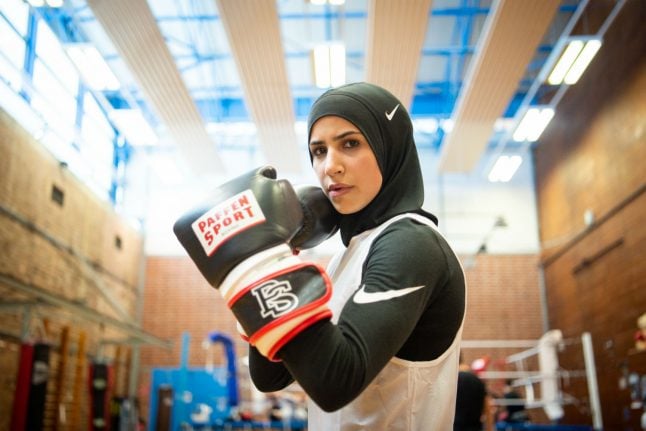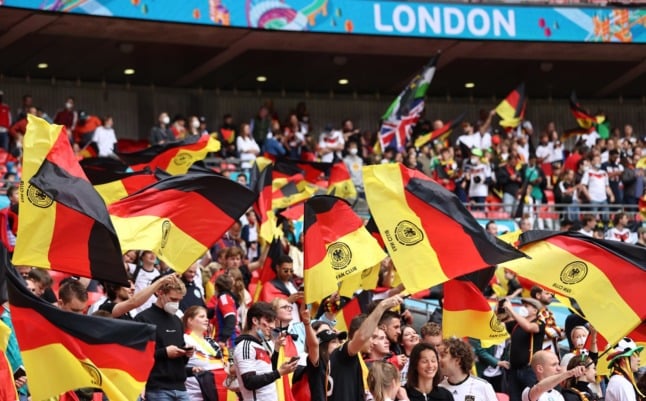Today, the 21-year-old, who discovered female boxing by watching online videos as a teenager, is a German amateur featherweight champion and dares to dream of Olympic glory.
Her path so far took all the determination she could muster, Nassar told AFP, sipping an iced coffee at a cafe in Berlin's Kreuzberg district, where she grew up.
“It was as if I had to prove twice as much because not only am I a woman who boxes, but I also wear the headscarf,” she said, during a break between gruelling training sessions.
“In the end it made me stronger,” she laughed, her made-up face known to countless Instagram fans framed by a pastel-coloured floral headscarf, sunglasses perched on top.
Next year's Tokyo Olympics and then the Paris Games in 2024 “are my great dream, my great goal,” smiled the young woman.

Nassar training in Berlin in October 2018. Photo: DPA
That dream only came within reach in February, when the International Boxing Association (AIBA) amended its rules to allow Muslim boxers to wear a hijab and fully cover their bodies in the ring.
When it comes to qualifying, “now the prerequisites are the same for all,” said Nassar, who in training and in competition wears the head covering as well as a full-length top and leggings.
“Only sporting performance should count. We must not be reduced to our external appearance.”
'I'm super fast'
Her list of achievements already includes six Berlin titles in the featherweight category, and the 2018 German Championship title.
In 24 official fights, Nassar, who weighs 57 kilos, recorded 18 victories, including one by KO, which is rare in this category.
“My boxing style is very unconventional but I'm super fast. It's my strength,” she said, mimicking a few uppercuts and hooks.
“For my opponents it's very unpleasant to box against me,” she laughed.
But for many years, the education and sociology student could not compete in international fights because of her attire.
This year, the German Boxing Federation, which had changed its own rules in 2013, put forward Nassar for the European Under-22 Championships, which however barred her due to her outfit.
Nassar, who also speaks Arabic and regularly travels to Lebanon, her parents' country of origin, said it never occurred to her to take off her hijab for boxing.
“Why should I have done that?” she said. “For me it has always been clear that I would fight with my headscarf.”
In Germany, the wearing of the headscarf tends to be widely accepted on the grounds of religious freedom.

Nassar outside of the Berlin boxing hall. Photo: DPA
Critics
The fight isn't won yet, however.
The Berliner's Olympic ambitions, like those of other sportswomen wearing the headscarf, run up against critics who brandish a rule for the Olympics prohibiting the display of any political, religious or racial symbols.
“Even if the boxing association, like most federations, has given in, the Olympic Charter has not changed,” argued Annie Sugier, president of the International Women's Rights League.
Criticizing the participation in the Olympics of countries such as Iran and Saudi Arabia whose sportswomen have to be covered “from head to toe”, Sugier called hijabs in sports “sexual apartheid”.
In France in April, Iranian female boxer Sadaf Khadem won her first official fight dressed in shorts and a vest.
'Modest fashion'
Despite the controversy surrounding the hijab in some Western countries, sportswear giants have already begun offering less skin-revealing clothes to cash in on the “modest fashion” market, which is now worth hundreds of millions of euros.
Nassar is a brand ambassador for US sportswear maker Nike, which has been marketing a sports hijab for nearly two years.
The female boxer, who is very active on social media, has become a role model for young Muslim women in particular.
“If you want to get to the top, you have to fight,” read a recent message by the boxer.
“Nothing is simply a gift. Accepting challenges and growing beyond them. And don't forget to smile.”
Before leaving the cafe, she posted a new picture of herself on Instagram and told AFP: “I want to show people that anything is possible if you fight for it.”
Nassar's picture was also used in a poster campaign to mark the 70th anniversary of the German constitution, the Basic Law.
It promoted Article 4, which states that “the undisturbed practice of religion shall be guaranteed”.



 Please whitelist us to continue reading.
Please whitelist us to continue reading.
Member comments